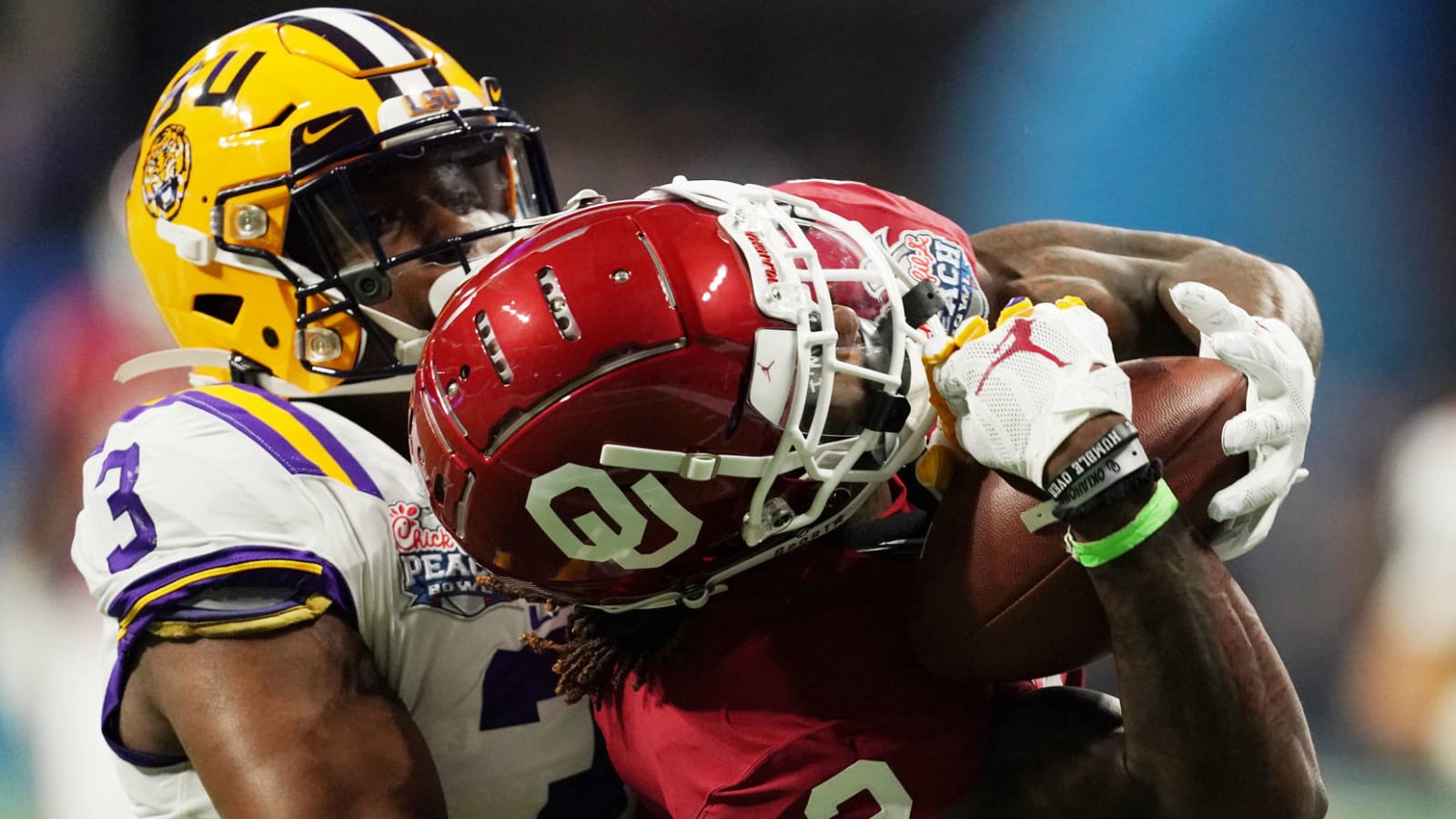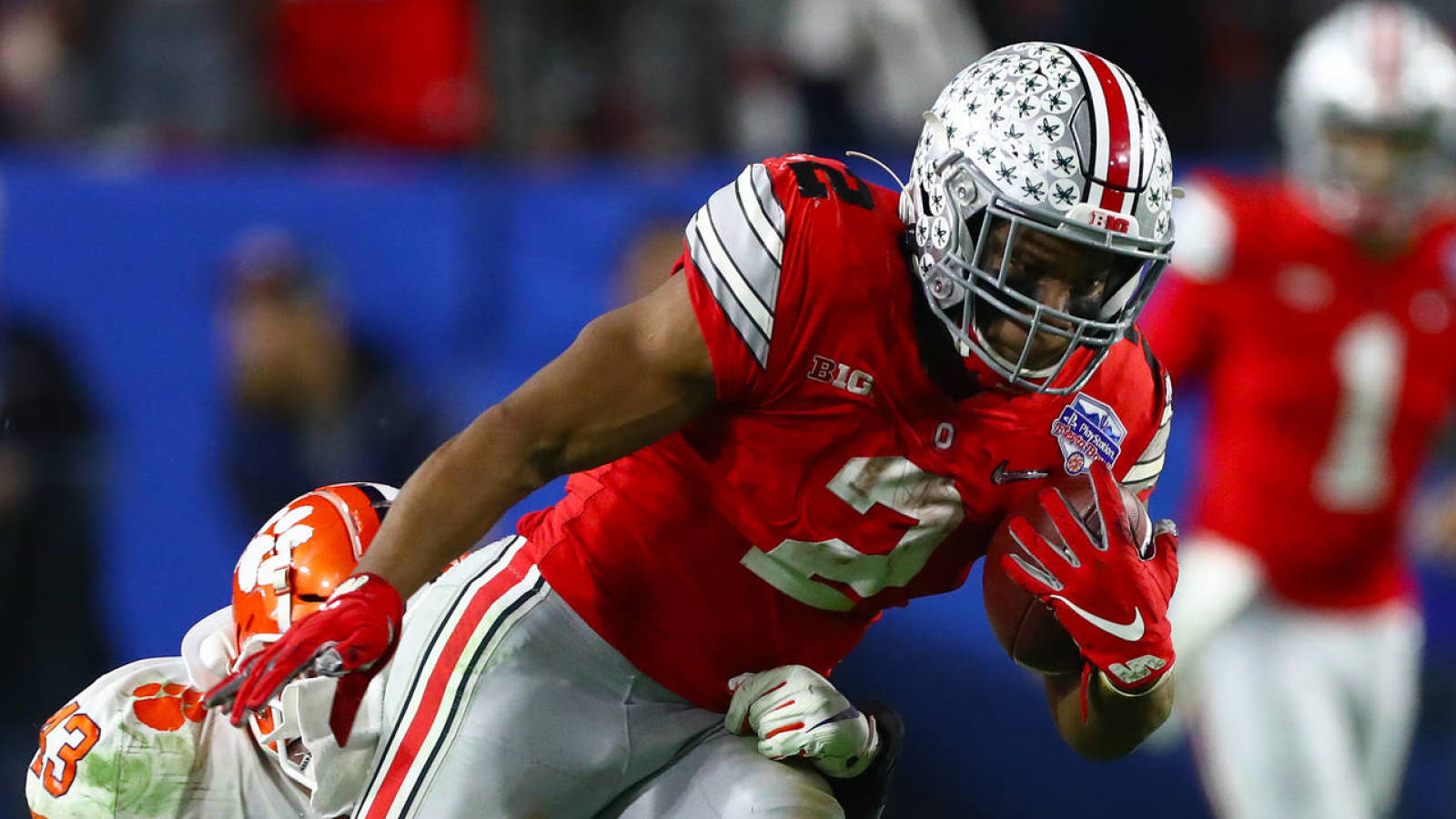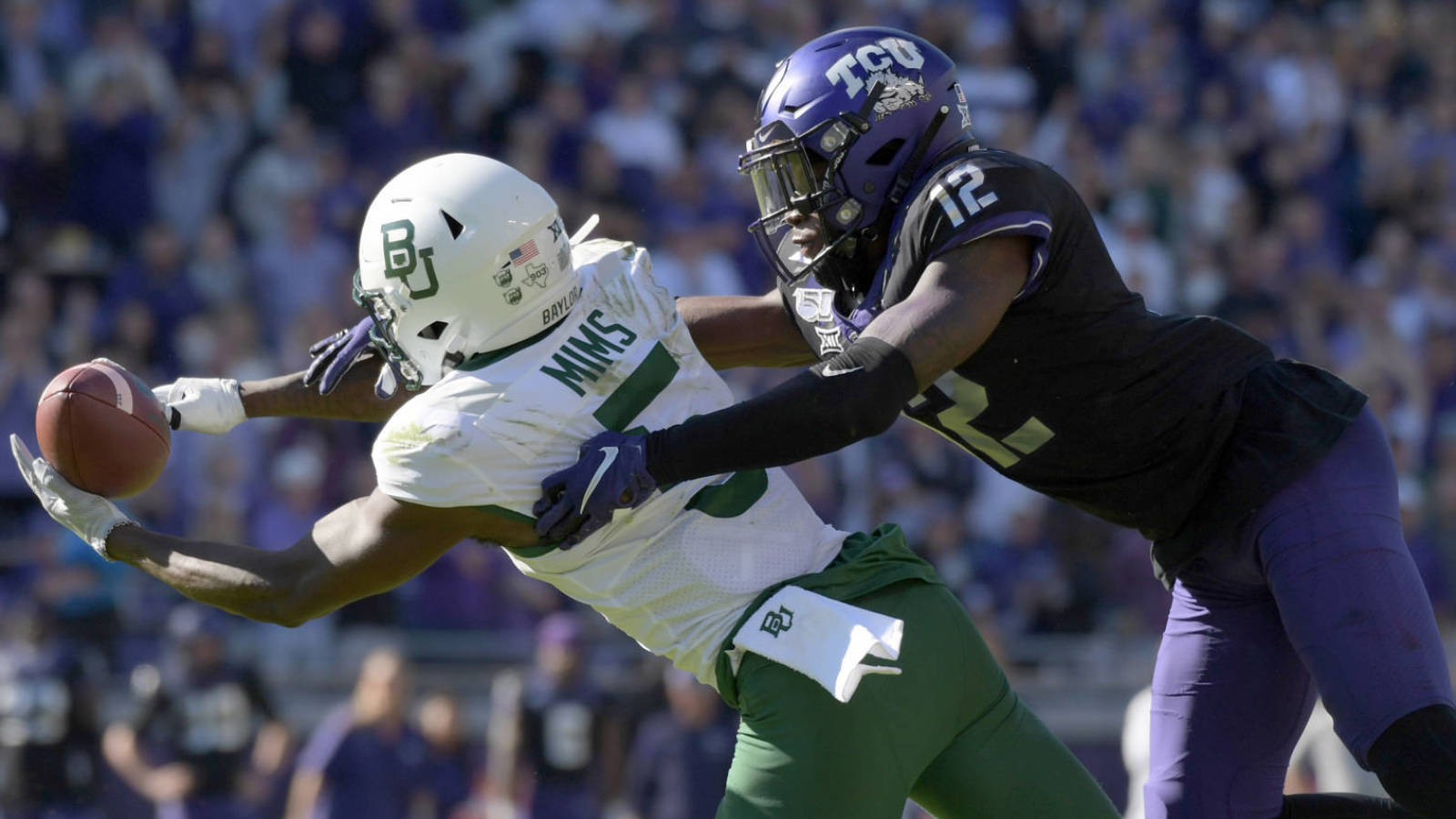
Teams that crushed it (Cowboys!) or blew it (Patriots) in draft
The highly successful virtual draft is in the books. But not every franchise drafted well. Yardbarker's Sam Robinson, Chris Mueller and Michael Nania weigh in on the teams that crushed it and those that didn't.
Crushed it: Cowboys | Blew it: Raiders
Dallas draft picks | Las Vegas draft picks
ROBINSON: In selecting Oklahoma wideout CeeDee Lamb at No. 17, the Cowboys were one of the few teams that went with the best player available in the first round. Lamb, who received the third-highest grade of receivers evaluated by Pro Football Focus in the past seven drafts, has been compared to DeAndre Hopkins (albeit shorter, at 6-foot-1). He has superior playmaking ability after the catch and will give QB Dak Prescott a better chance to justify the contract he seeks.
Lamb, who amassed 3,292 yards receiving in college, managed to slip past the Raiders at No. 12 and receiver-needy 49ers at 14. He will take pressure off Amari Cooper. These two are in position to form a long-term tandem that could be the Cowboys’ best since Michael Irvin-Alvin Harper in the 1990s.
Dealt a blow when All-Decade center Travis Frederick retired, the Cowboys may have found a replacement in the fourth round. Tyler Biadasz comes from perhaps Division I’s most proven run-oriented program (Wisconsin) and won last year’s Rimington Trophy (given to the nation’s top college center). PFF graded the two-time first-team All-Big Ten performer as a high-end run-blocker in each of his three Badgers seasons.
A 2019 hip surgery and 2020 shoulder procedure hurt Biadasz’s stock, creating an opportunity for the Cowboys at No. 146. Joe Looney may reprise his role as Frederick’s replacement to start this season, but Biadasz may be his true successor. Fourth-round picks do not usually provide such hopes.
Some mocks had Trevon Diggs going in Round 1; the Cowboys landed the Alabama cornerback at No. 51 overall. Stefon Diggs’ younger brother will join Tulsa-developed corner Reggie Robinson, a high-upside athlete who clocked a blazing 4.44-second 40-yard dash at the combine despite weighing 205 pounds. This gives the Cowboys quantity and potential quality in their effort to replace Byron Jones. Finding value on all three days of the draft, the Cowboys did well to stock their roster with cost-controlled talent -– a necessity when Cooper, Ezekiel Elliott and Prescott will be making top-market money.
On the flip side, the Raiders gambled with a low-production/high-upside speedster Henry Ruggs at No. 12. Ruggs’ 4.27-second 40 speed could well make him a better game-breaker than Lamb or his Crimson Tide teammate Jerry Jeudy, but he recorded Alabama’s third-most receiving yards in each of the past two years and never amassed 750 in a season.
Going for a Tyreek Hill sans-baggage weapon, the Raiders passed on much higher-floor prospects (Jeudy and Lamb) and paired this draft’s top deep threat with the conservative QB Derek Carr. The latter has not enjoyed much help at receiver since the 2018 Cooper trade. He ranked last and second to last in Next Gen Stats’ intended air yards metric the past two years, respectively. This could be a rocky fit.
Almost no one tabbed Damon Arnette, Ohio State’s No. 2 cornerback, as a first-round pick. The Raiders used the No. 19 choice on a soon-to-be 24-year-old corner with a 4.56-second 40. He is the first corner drafted in Round 1 with a 40 time over 4.55 and arms shorter than 30 inches in 30 years.
The Raiders grabbed Clemson’s John Simpson, The Athletic’s No. 2-rated guard, in the fourth round and picked two wideouts (Kentucky's Lynn Bowden and South Carolina's Bryan Edwards) in the third. But Vegas didn't pick a defensive lineman, which seems odd considering it ranked 30th in 2019 DVOA against the pass and has not assembled a top-16 scoring defense since 2003. Arnette at 19 represented one of this draft’s worst value picks and could leave the Raiders lacking again in a key area.

Crushed it: Ravens | Blew it: Patriots
Baltimore draft picks | New England draft picks
MUELLER: No team was better in the 2019 regular season than the Ravens, and, in an unfortunate development for their AFC brethren, no team had a better draft than Baltimore. General Manager Eric DeCosta’s draft theme could be summed up by one word; value. The majority of Baltimore’s early picks were bargains, players projected to have come off the board long before the Ravens should have had a chance at them. What’s more, they all just seem to be perfect fits.
Baltimore was third in scoring defense and fourth in total defense last season. If there was any area where it was even slightly vulnerable, it was against the run (4.4 yards per carry, 21st in NFL). What was already a mild issue had the potential to get much worse, with inside linebackers Patrick Onwuasor and Josh Bynes departing in free agency. DeCosta had the answer, taking LSU linebacker Patrick Queen with the 28th pick, then tacking on Ohio State linebacker Malik Harrison with one of the team’s four third-round picks. Queen should be a starter from Day 1.
DeCosta also gave Lamar Jackson more weapons. Ohio State running back J.K. Dobbins fell into Baltimore’s lap with the 55th pick. The Ravens already have a crowded backfield, but adding another talented player to the group gives them built-in insurance, plus flexibility should they want to make a trade. With the 92nd pick, Baltimore added Texas slot receiver Devin Duvernay, who has sub-4.4 speed.
On the flip side, Bill Belichick’s first rebuilding attempt post-Tom Brady in New England was curious, to say the least. Belichick traded out of the first round and selected Division II Lenoir-Rhyne safety Kyle Dugger with the 37th pick. Dugger has a high ceiling, but he’s far from a sure thing. Michigan’s Josh Uche and Alabama’s Anfernee Jennings are interesting pass-rushers, and Uche’s positional versatility could be devastating under Belichick’s tutelage. But neither appears ready to be a major contributor right away.
Unless Cam Newton or Andy Dalton are added, Jarrett Stidham is the man at quarterback for New England. Belichick didn’t exactly bend over backward to help him. The Patriots picked just two offensive skill players, tight ends Devin Asiasi (UCLA) and Dalton Keene (Virginia Tech). Asiasi is an intriguing target, but better-regarded Dayton tight end Adam Trautman was still on the board when Belichick took Keene.
Most notably, the Pats did not draft a quarterback, and in the fifth round, New England took Marshall kicker Justin Rohrwasser, who's making headlines for all the wrong reasons.

Crushed it: Jets | Blew it: Packers
NYJ draft picks | Green Bay draft picks
NANIA: A disciple of former Ravens personnel expert Ozzie Newsome, Jets GM Joe Douglas looked like a veteran behind the wheel throughout draft weekend. He plugged a litany of holes, never reaching to do so.
With the 11th pick in the first round, the Jets needed to select an elite offensive tackle (Jedrick Wills, Tristan Wirfs, Andrew Thomas, Mekhi Becton) to improve the protection for QB Sam Darnold. Instead of moving up to get one, Douglas stood pat, and things played out in his favor. Becton and Wirfs fell to New York's spot, and Douglas went with Becton. Good move.
Having lost Robby Anderson from their thin outside wide receiver group, the Jets needed to find a starting receiver. Fortunately, this was one of the deeper wide receiver classes in history. Baylor's Denzel Mims, widely considered a first-round prospect, was available to the Jets at the 48th pick. Instead, Douglas moved down 11 spots, adding two fourth-round picks in the process, and New York got Mims with the 59th pick.
Douglas also added Ashtyn Davis (safety, California), Jabari Zuniga (EDGE, Florida), La'Mical Perine (RB, Florida), James Morgan (QB, Florida International), Cameron Clark (guard, Charlotte), Bryce Hall (CB, Virginia) and Braden Mann (punter, Texas A&M). He traded a sixth-round pick for 2017 Colts second-rounder Quincy Wilson, a cornerback.
Douglas found a happy medium between the "best player available" and "draft for need" schools of thought.
And then there is the Packers, who had one of the more puzzling drafts.
Aaron Rodgers is one of the greatest quarterbacks of all time, but he had a down year in 2019 by his standards, ranking 12th in passer rating (95.4). A huge reason for that decline was Green Bay's struggles at wide receiver. Davante Adams was stellar when healthy, ranking fifth in the NFL with 83.1 receiving yards per game, but the next-closest Packers wide receiver was Allen Lazard (29.8). After doing little in free agency at the position (their only addition was the underwhelming Devin Funchess), the Packers had a perfect opportuntiy to take a wide receiver with the 30th overall pick.
Instead, Green Bay traded up to No. 26 to take Utah quarterback Jordan Love, and the Packers didn't take a wide receiver among their nine selections. In the second round, they selected Boston College running back A.J. Dillon even though they have one of the league's best RB tandems in Aaron Jones and Jamaal Williams. Strange indeed.
More must-reads:
- 32 roster issues to monitor after the 2020 NFL Draft
- Smartest draft pick for every NFL team
- The '100 catches in an NFL season' quiz
Breaking News
Customize Your Newsletter
 +
+
Get the latest news and rumors, customized to your favorite sports and teams. Emailed daily. Always free!

